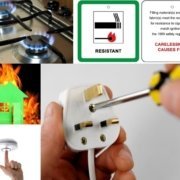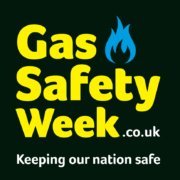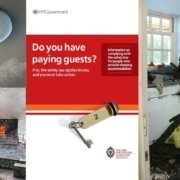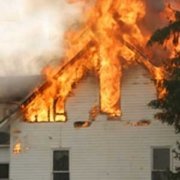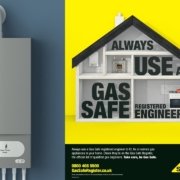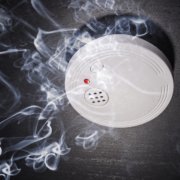Holiday letting guest safety – understanding your obligations.
Last Updated on March 11, 2016 by admin
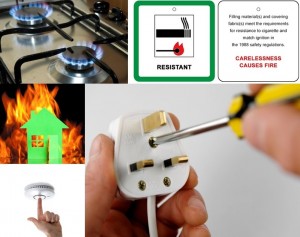 As a holiday homeowner there will be plenty for you to think about; how are bookings looking? Which letting agent do you use? Is the cottage in need of repairs and when does the next tax return need to be submitted by?
As a holiday homeowner there will be plenty for you to think about; how are bookings looking? Which letting agent do you use? Is the cottage in need of repairs and when does the next tax return need to be submitted by?
With such a long list, one thing you’ll need to keep at the very top is holiday letting guest safety. Your commitment to providing your guests with a stay that is not only enjoyable, but also safe is paramount.
Staying up to date with latest legislation changes set by the Health and Safety Executive (HSE) is essential for anyone in the industry in order to protect themselves and their guests.
We’ve highlighted some of the key areas of holiday letting guest safety you need to be considering that will help you understand your obligations.
Gas safety – what do you need to do?
There have been more than 200 reported gas safety incidents in the UK over the past year, with 40 people tragically losing their lives as the result of the poisonous, odourless and silent killer that is carbon monoxide.
The consequences of getting gas safety wrong can be loss of life so it’s essential you’re doing the following:
- You are now legally required to have working smoke and carbon monoxide alarms fitted within your holiday home. These should be installed in rooms in which there are gas boilers, fires or any fuel burning appliance or open fire.
- Your gas boiler and any other gas appliances must, by law, be serviced and have a gas safety check carried out by a Gas Safe Registered Engineer every year.
If you are a letting agent you should obtain Gas Safe Check certificate from the holiday homeowner annually to ensure this has been carried out and that the property is safe for guests. For further information on gas safety read our blog post – Holiday Home Gas Safety
Up to date Gas Safety Check Certificate(s) or a copy should be kept in the holiday home’s Welcome Folder Information Pack to give guests peace of mind.
Preventing fire – what do you need to do?
Fire Safety Law (known as Regulatory Reform (Fire Safety) Order 2005) was introduced in 2006 and makes holiday homeowners responsible for taking measures to protect guests from the risks of fire.
- As a holiday homeowner you are required to conduct a fire risk assessment, improve fires safety measures as a result of any issues highlighted in the assessment, and keep the risks and measures under review. For more information on how to conduct a fire risk assessment please read our blog – Fire Safety Law for Holiday Letting
- Despite 88% of fires being accidental, it is vital that you remain vigilant in reducing any potential risks in your holiday home and this should extend to your furniture. Regulations, whilst largely focussed on manufacturers, now extends to the ‘supplier of furniture acting in the course of business’, which of course applies to the owner of the holiday home. For full information on the requirements you need to meet please read our blog post – Fire Safety of Furniture and Furnishings in your Holiday Home
Electrical equipment
Over the years our homes and cottages have become awash with electrical appliances and devices. They bring with them convenience, but also an on-going maintenance task. So what do you need to do in terms of checking and replacing your appliances?
- You have a legal obligation to ensure that any electrical appliance in your holiday home with the potential to cause injury is kept in a safe condition for your visitors to use.
- Conduct regular visual checks of your appliances, or if you live a good distance from your holiday home, ensure someone is given responsibility for this task.
- Remember that not all faults will be visible. Whilst there is no legal requirement for you to undertake Portable Appliance Testing (PAT), it is good practice and will help to demonstrate a general duty of care if these checks are carried out in conjunction with regular visual checks.
- If a visitor reports a potential fault with an electrical appliance ensure it is removed from the holiday home until such time that it can be examined by a professional, or replaced as required.
You may also find the following posts for holiday home owners of interest:
- Fire Safety Law For Holiday Letting
- Fire Safety for guests with hearing loss
- Holiday home gas safety checks
- Solid fuel fire safety for holiday home owners
- Protect yourself and your guests from carbon monoxide poisoning
- Preventing the five most common causes of fire holiday homes
Boshers offer specialist holiday home insurance to owners across the UK. For more information on how a specialist insurer can help and support your holiday home business, please give us a call on 01237 429444.
Please note that this article on holiday letting guest safety is only intended as an overview of what you need to be doing in each of these areas. For further information please contact the relevant authority and read up on all procedures and requirements.
